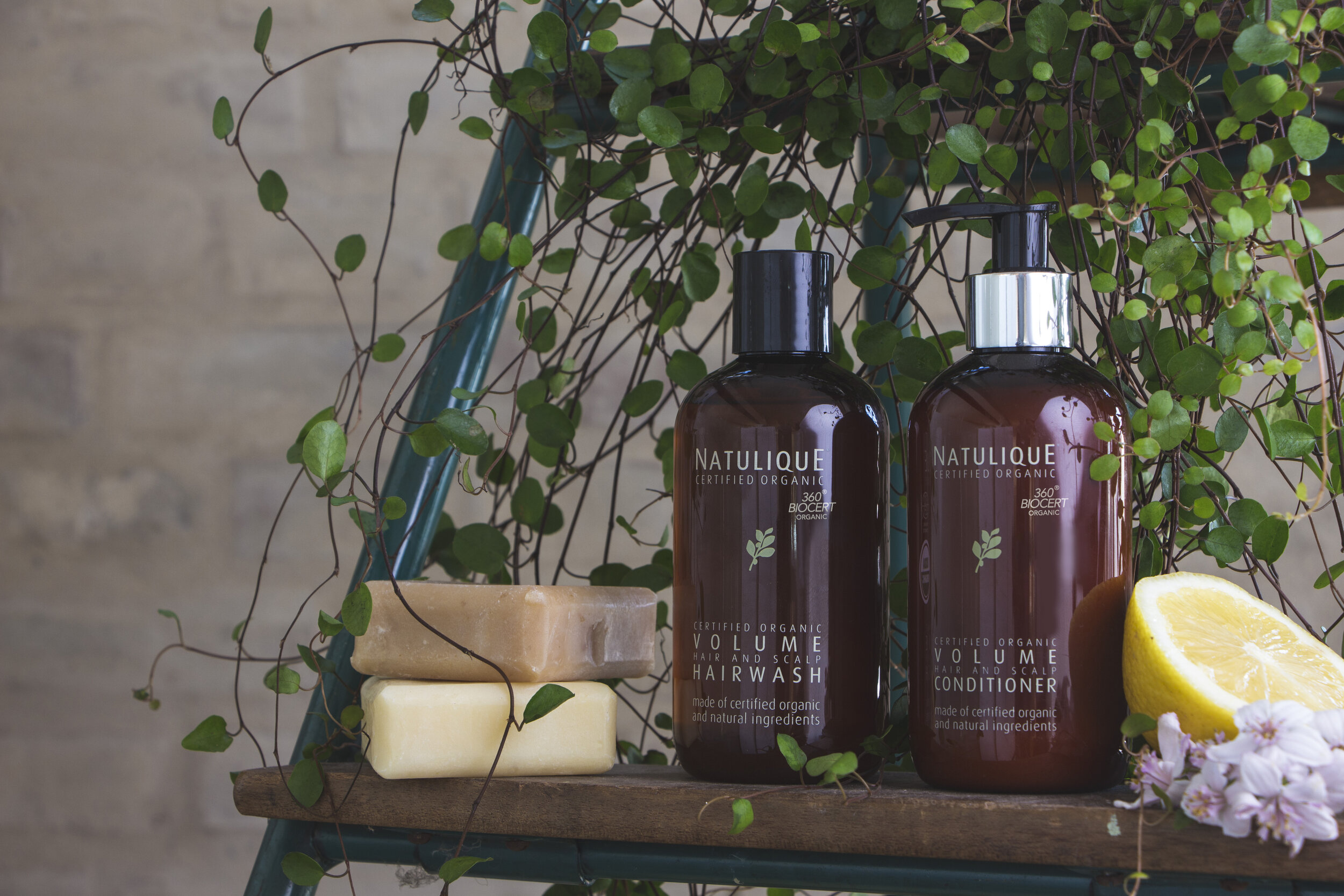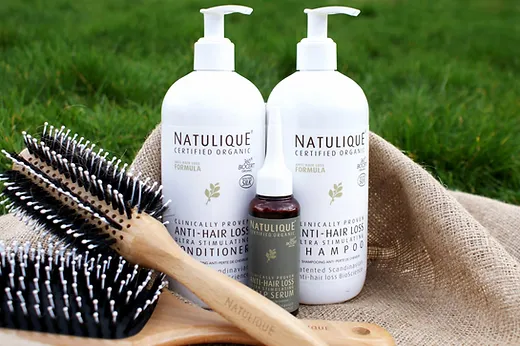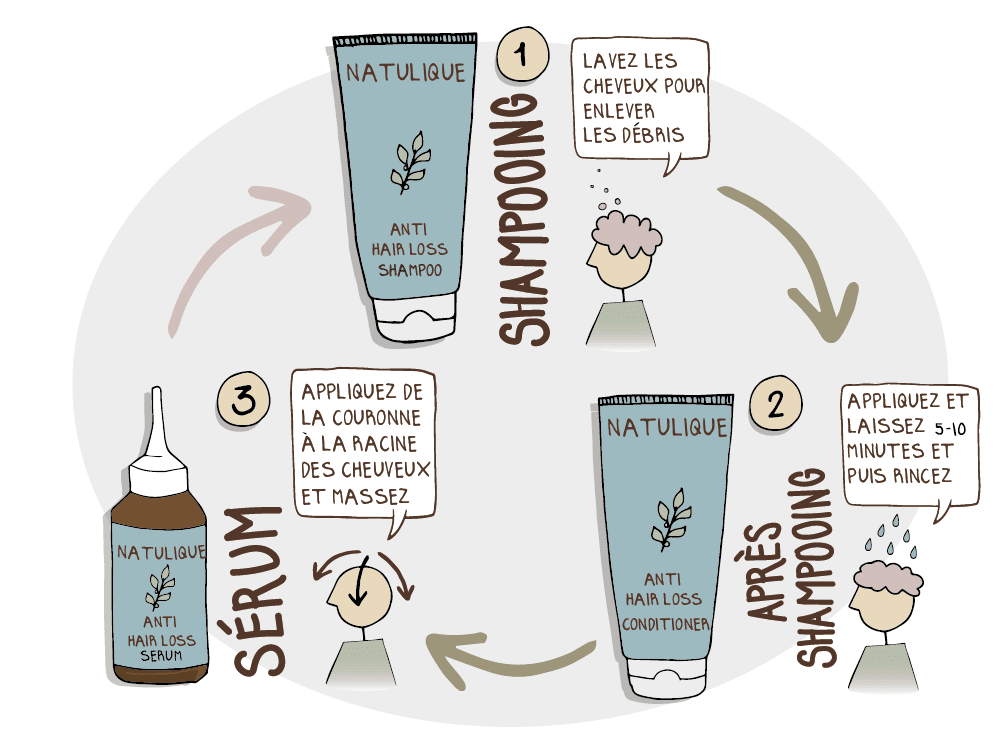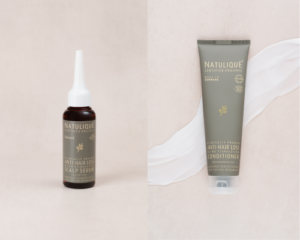Choosing the right shampoo for your hair is not always an easy task. In fact, each hair type requires specific care to stay healthy. That's why it's essential to understand the nature of your hair before choosing a shampoo that's right for you.
Understanding the nature of your hair
Hair type identification
Correctly identifying your hair type is the first step to finding the ideal shampoo. Hair can be categorized into different sub-categories, each with its own particularities.
Dry hair
Dry hair often lacks shine and suppleness. It tends to be brittle and frequently has split ends. This type of hair needs a moisture-rich shampoo to absorb moisture and restore its natural shine.
Greasy hair
Greasy hair is characterized by excess sebum, giving the hair an oily appearance shortly after washing. A good shampoo for oily hair should be purifying, to regulate sebum production without drying out the scalp.
Normal hair
Normal hair is neither too dry nor too greasy. It benefits from a natural balance that keeps it healthy and shiny. A gentle shampoo that maintains this balance is ideal.
Combination hair
Combination hair has oily roots and dry ends. This type of hair requires a balancing shampoo that purifies the scalp while moisturizing the ends.
Specific considerations
Colored hair
Color-treated hair requires special care to preserve color radiance. A shampoo specially formulated for color-treated hair helps protect and prolong color intensity while preventing fading.
Frizzy/afro hair
Frizzy or afro-type hair is often dry and requires highly nourishing care. A shampoo rich in natural oils and moisturizing agents is essential to maintain health and elasticity.
Thin or thick hair
Fine hair generally lacks volume and can appear flat. For this, a light but volumizing shampoo is recommended. Conversely, thick hair needs products that will discipline it without weighing it down.
Sensitive hair and irritated scalp
Sensitive hair or irritated scalps require gentle formulas, free from irritating ingredients such as sulfates. A hypoallergenic shampoo can help soothe these conditions and provide a gentle wash.
Familiarize yourself with shampoo types
Moisturizing shampoo
Moisturizing shampoos are designed to nourish hair and increase its moisture level.
Benefits
- They restore suppleness and softness to dry or damaged hair.
- Promotes better elasticity and reduces the risk of breakage.
Disadvantages
- Rich in moisturizing agents, they can weigh down fine hair.
- To be avoided if the scalp is already oily, as they can exacerbate the problem.
Purifying shampoo
These shampoos target excess sebum and residue on the scalp for a refreshing sensation.
Benefits
- Ideal for oily hair by regulating sebum production.
- Effectively removes impurities and styling product residues.
Disadvantages
- Can dry out tips if used too frequently.
- Use alternately with a mild shampoo for sensitive scalps.
Volumizing shampoo
Specially formulated to add body and volume to fine hair.
Benefits
- Gives flat hair a thicker, fuller look.
- Generally lightweight, it helps prevent hair from becoming weighed down.
Disadvantages
- May not be suitable for very thick hair, where it may not be effective.
- The light formula may not provide sufficient moisture for dry hair.
Shampoo for color-treated hair
Formulated to protect color and prolong its life.
Benefits
- Helps preserve color radiance and vibrancy longer.
- Often enriched with UV filters to protect against sun discoloration.
Disadvantages
- May not provide sufficient moisture for very dry hair.
- Some may contain sulfates, which should be avoided for very bright colors.
By choosing the right type of shampoo, you can improve not only the appearance of your hair, but also its overall health. Understanding your hair's specific needs is crucial to selecting the most suitable product and getting the most out of your hair routine.
See also: How can I reduce a yellowish effect after bleaching?
Ingredients to choose and those to avoid
Beneficial ingredients
Knowing which ingredients to choose for your shampoo can make all the difference to the effectiveness of your hair routine. Certain natural compounds are particularly beneficial to the health of your hair.
Proteins
- Silk proteins : These proteins penetrate hair easily, providing intense hydration and improving elasticity. They are ideal for dry or damaged hair.
- Keratin : Also a protein, it helps strengthen hair and reduce breakage. Sought-after for chemically-treated or heat-damaged hair.
- Collagen : Strengthens hair structure and adds volume to fine hair. It also makes hair more luminous.
Natural oils
- Argan oil : Rich in essential fatty acids and vitamin E, this oil intensely nourishes dry, frizzy hair, adding shine and softness.
- Coconut oil : Known for its moisturizing and repairing properties. It penetrates the hair shaft, reducing protein loss and keeping hair healthy.
- Jojoba oil : Ideal for oily scalps as it regulates sebum production while lightly moisturizing.
Ingredients to avoid
Some common ingredients in shampoos can damage the health of your hair. It's important to know which ingredients to avoid to preserve your hair's shine and strength.
Sulfates
- Sodium Lauryl Sulfate : A powerful cleansing agent that removes not only dirt, but also natural oils, leaving hair dry and scalp irritated.
- Sodium lauryl ether sulfate : It can dry out hair and cause irritation, especially on sensitive scalps.
Silicones
- Dimethicone : Although it gives a smooth, shiny appearance, it can create a tight film around the hair, preventing other nutrients from penetrating.
- Cyclomethicone : Can cause build-up on scalp and hair, making them heavy and clogged.
Parabens
- Methylparaben : Used as a chemical preservative, it can disrupt hormonal balance and cause irritation in some people.
- Propylparaben : Another preservative to avoid, especially for those looking for more natural products.
Choosing shampoos with beneficial ingredients while avoiding potentially harmful ones is essential to maintaining healthy, shiny hair full of life. It's a good idea to read labels carefully and choose products formulated with care and respect for your hair's needs.
Adapt your hair routine to your needs
Environmental considerations
Humid climate
In areas characterized by high humidity, hair can become frizzy and unruly. The use of an anti-static shampoo combined with moisturizing treatments can help maintain hair control and softness.
Dry climate
Environments with low humidity levels can dry out hair and scalp. We recommend choosing the right moisturizing shampoo to counteract drying effects and preserve hair's natural moisture.
Urban pollution
Pollution can damage hair, leaving it dull and fragile. Opt for a clarifying shampoo that eliminates impurities and pollution particles, while adding vitality and shine.
Washing frequency
Daily wash
For those who wash their hair daily, it's crucial to choose a gentle shampoo that won't irritate or dry out the scalp. Look for formulas with light cleansing agents.
Less frequent washing
If you wash your hair less often, a purifying shampoo can be ideal for removing product build-up and refreshing your scalp. Alternate with moisturizing shampoos to prevent dryness.
Use of styling products
For styling product lovers
Styling products such as gels and hairsprays can leave residues on the hair. Occasional use of a clarifying shampoo can help remove these deposits.
Thermal protection
If you regularly use heated tools, such as a straightening iron or hair dryer, opt for a thermoprotective shampoo that protects the hair fiber from thermal aggression.
FAQ
What's the ideal shampoo for curly hair?
Curly hair benefits from shampoos rich in natural oils to moisturize curls and reduce frizz.
How do I choose a shampoo for a sensitive scalp?
Look for shampoos labeled hypoallergenic, sulfate- and paraben-free, to minimize irritation and soothe the scalp.
Does dry shampoo affect my choice of traditional shampoo?
No, dry shampoo is a complement that helps to space out traditional washes by absorbing excess sebum.
Why avoid certain ingredients in shampoos?
Ingredients such as sulfates and parabens can irritate the scalp and dry out hair, so it's important to choose gentler formulas.
How do I know if a shampoo is right for my hair type?
Observe the texture and health of your hair after several uses. Hair should be soft, shiny and manageable.





